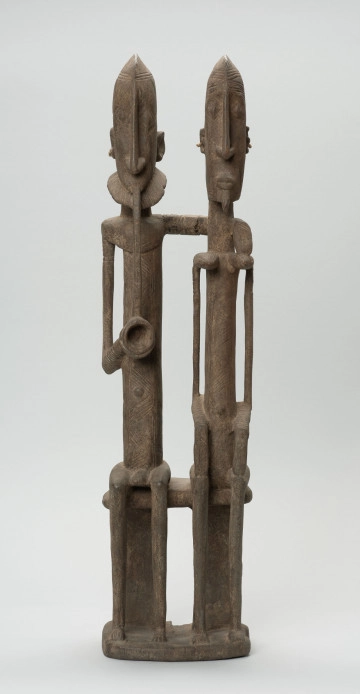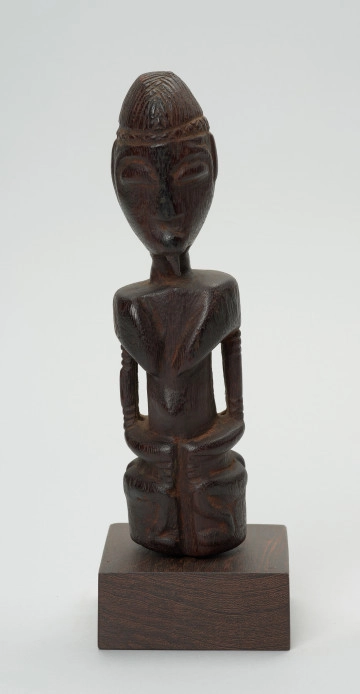
Figure - couple of ancestors
między 1951 — 2000
National Museum in Szczecin
Part of the collection: Collection of Dogonian art
The representation of a pair of ancestors has a symbolic meaning for the Dogon. The number 2 is a sign of perfection and balance between the divine and the human. Although marriage is a kind of contract between two families for the Dogon, feelings also play an essential role. In their oral tradition, there are many examples of songs and poems praising the beloved woman-wife. Among the Dogon, there is endogamy, a tradition of marrying within one's group. The inhabitants of the Dogon country are very negative about mixed marriages. They are connected to the Bozo and Kurumba peoples living in the neighbourhood by a legendary brotherhood, and sexual relations with representatives of these groups are treated as incest. The Fulbe, another neighbouring people, who work as shepherds, are treated with contempt by the Dogon. Although the men adore the Fulbe women, they regard them as wrong partners incapable of fulfilling the farmer's wife's duties. A man may have more wives, but the most important (great wife) is always the first to live with her husband, the mother of his first child. In the Dogon, there is a certain amount of sexual freedom, wife abductions occur, having lovers is also tolerated, but marital fidelity is an excellent, appreciated value. The ancestral pair probably refers to the mythical Nommo, who did not have distinguishable features of one sex. The evocation of male and female unity not only serves to sustain fertility but is also a tool to ensure the ancestors' benevolence. The identical size of the depicted figures demonstrates the ideal, harmonious union of spouses.
Ewa Prądzyńska
Author / creator
Dimensions
cały obiekt: height: 31,6 cm, width: 21,3 cm
Object type
figure
Creation time / dating
Creation / finding place
Identification number
Location / status

unknown
między 1951 — 2000
National Museum in Szczecin

unknown
między 1951 — 2000
National Museum in Szczecin

unknown
około 1970
National Museum in Szczecin
DISCOVER this TOPIC
Museum of King Jan III's Palace at Wilanów
DISCOVER this PATH
Educational path
0/500

We use cookies to make it easier for you to use our website and for statistical purposes. You can manage cookies by changing the settings of your web browser. More information in the Privacy Policy.
We use cookies to make it easier for you to use our website and for statistical purposes. You can manage cookies by changing the settings of your web browser. More information in the Privacy Policy.
Manage cookies:
This type of cookies is necessary for the website to function. You can change your browser settings to block them, but then the website will not work properly.
WYMAGANE
They are used to measure user engagement and generate statistics about the website to better understand how it is used. If you block this type of cookies, we will not be able to collect information about the use of the website and we will not be able to monitor its performance.